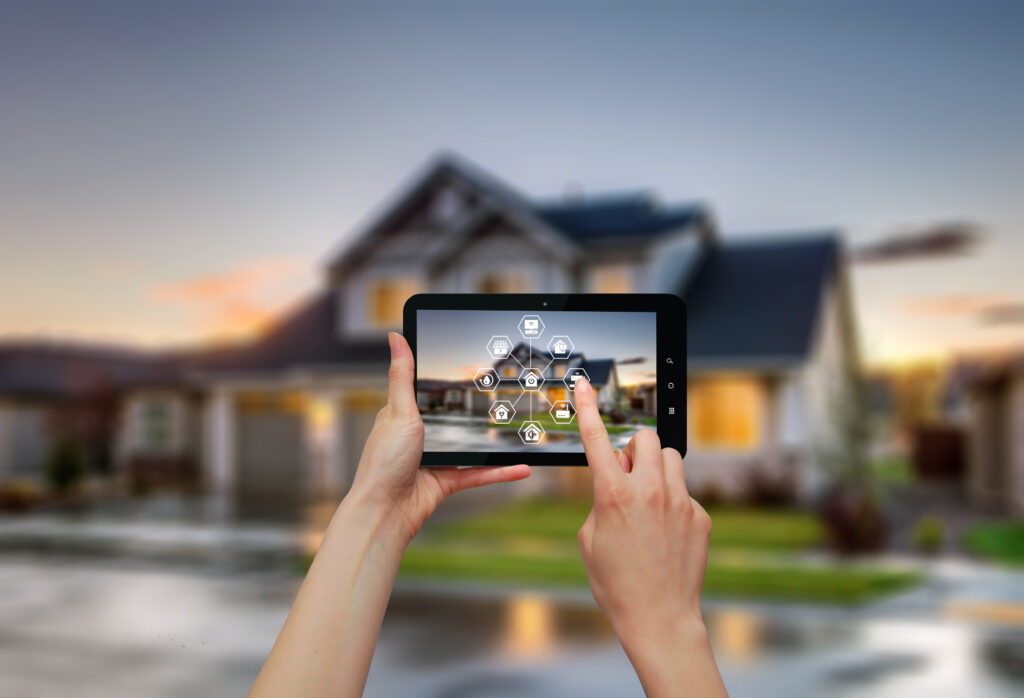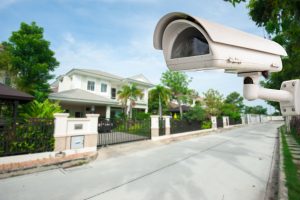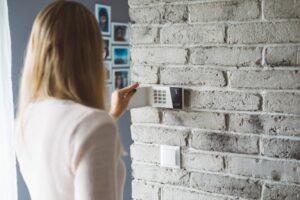
*Updated July 14th, 2025
Your home should be a sanctuary where you feel safe and secure. Even in low-crime neighborhoods, a home security system adds an extra layer of protection—and peace of mind. Today’s best home security systems do more than just deter intruders. Many include smart technology to detect fires, carbon monoxide leaks, and suspicious activity in and around your home.
But what’s the real cost of a home security system? Prices can vary widely, depending on system type, features, and whether you choose professional monitoring. In this guide, we’ll break down everything from installation fees to monthly monitoring costs, helping you choose the best home security setup for your needs and budget.
Top Factors That Influence Home Security System Costs
No two homeowners will pay exactly the same amount for a security system. Key factors that influence home security system costs include the type of system, additional equipment, and monitoring services.
1. Type of Security System
There are many types of home security systems available, all designed to help keep your property safe. Most systems fall into two categories:
Monitored Systems
-
Self-monitored systems: You monitor activity yourself via a mobile app. These typically include motion detectors, door/window sensors, and indoor/outdoor cameras.
-
Professionally monitored systems: Companies like ADT Security and Vivint monitor your system 24/7 and contact emergency services if an alarm is triggered.
💡 Monitoring typically costs between $10 and $75 per month, depending on the provider and level of service.
Unmonitored Systems
Unmonitored systems emit loud alarms but don’t automatically alert authorities. These are typically more affordable, with no monthly monitoring fees, and still include sensors and alarms.
2. Wired vs. Wireless Systems
Wired Home Security Systems
-
Require professional installation
-
More difficult to disable or hack
-
Average cost: $800 to $1,600
Wireless Home Security Systems
-
Easier to install and often DIY-friendly
-
Can integrate with smart home devices
-
Average cost: $200 to $2,000
Wireless systems often include remote control features, like adjusting thermostats or turning lights on/off, which add value and convenience.
Optional Add-Ons That Affect Home Security Costs
Video Surveillance
Adding cameras increases the system’s cost but offers real-time visibility into your home’s security.
-
Basic indoor camera: $50+
-
Advanced outdoor camera with night vision: $400–$500 per camera
-
Cloud video storage/monitoring: $40–$65 per month
Smart Home Integration
Smart features like smart locks, thermostats, lights, and garage door controls enhance your security system and energy efficiency.
-
Cost per feature: $150–$500
-
Compatible with systems from ADT, Ring, SimpliSafe, and more
Panic Buttons
Add an extra layer of safety by installing a panic button that immediately alerts emergency services.
-
Average cost: $50
Installation and Labor Costs
-
DIY installation: Free or minimal cost if you buy a system from Best Buy, Home Depot, or online
-
Professional installation: Typically $250–$500, depending on system complexity
Some companies include installation in the system price, while others charge separately.
Monthly Monitoring and Subscription Fees
Ongoing home security system costs usually include:
-
Monitoring fees: $10–$75/month depending on provider and services
-
Activation fees: One-time charge of $50–$200 (often negotiable or waived during promotions)
-
Environmental sensor monitoring (for smoke, carbon monoxide, or flood detection): A few dollars extra per month
Is a Home Security System Worth It?
At first glance, a home security system might seem like a big investment. But it can actually help you save money and increase your home’s value:
-
Lower insurance premiums: Many insurers offer 5% to 20% discounts with proof of an active security system. On a $1,428 annual policy, that’s up to $280 in savings.
-
Lower utility bills: Smart features let you manage energy usage remotely.
-
Prevent break-ins: A visible system (like ADT yard signs or cameras) may deter burglars entirely.
-
Increased home value: Buyers often see value in a professionally installed home security system.
Final Thoughts
Installing a home security system is one of the best ways to protect your home, family, and valuables. Whether you choose a DIY, wireless setup or a professionally installed and monitored system like ADT, the key is choosing a solution that fits your lifestyle and budget.
Modern systems offer more than just alarms—they integrate with smart home technology, help save energy, and may even reduce your insurance premiums. From basic packages to the best home security systems with all the bells and whistles, investing in home protection is a smart, long-term decision.
FAQs
What is the average monthly cost of a home security system?
The average cost is $30–$60/month, but can be lower or higher based on monitoring, video storage, and smart home features.
Can I buy my own home security system?
Yes, DIY options are available at major retailers. Many systems offer self-monitoring via mobile apps and are easy to install.
Is professional installation required?
Not always. DIY systems like Ring, SimpliSafe, and Wyze can be installed easily. Wired systems typically require professional setup.
Do I need 24/7 monitoring?
It’s optional. Professional monitoring adds peace of mind but increases monthly costs. Self-monitoring is cheaper but less responsive in emergencies.
What are common add-ons?
-
Security cameras
-
Smart locks
-
Environmental sensors (smoke, CO, flood)
-
Medical alert buttons
-
Smart lights and thermostats
Can I finance a home security system?
Yes. Many companies offer financing and run promotions like discounts, gift cards, or free equipment with a monitoring contract.
Will a home security system reduce my insurance premium?
Absolutely. Most insurers offer 5–20% discounts on premiums with verified security systems. This can offset the initial setup costs over time.
Additional Home Security Resources

Anna has over six years of experience in the home services and journalism industries and serves as the Content Manager at MyHomePros.com, specializing in making complex home improvement topics like HVAC, roofing, and plumbing accessible to all. With a bachelor’s degree in journalism from Auburn University, she excels in crafting localized, comprehensive guides that cater to homeowners’ unique needs. Living on both coasts of the United States has equipped her with a distinctive perspective, fueling her passion for turning any house into a cherished home through informed, personalized decision-making.
Connect with top-rated local contractors who can help you with siding, roofing, HVAC, windows, and more. Get free quotes from verified professionals in your area today.







